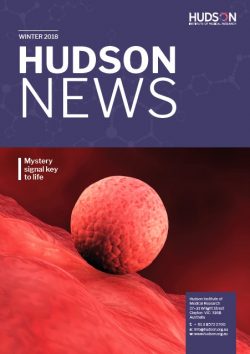A truly innovative program launched in February to improve treatment outcomes for children diagnosed with brain and solid tumours is already achieving results, helping clinicians, children and their families.
The Hudson Monash Paediatric Precision Medicine Program is a collaboration with the Monash Children’s Hospital Cancer Centre and is funded with a generous $1.3 million investment from the Children’s Cancer Foundation. This funding has enabled 12 researchers, oncologists and pathologists to work together towards a cure.
Each year, 950 Australian children are diagnosed with cancer, almost half of them under the age of four. The program aims to improve these statistics and reduce the long-term health impacts of chemotherapy and radiation on children.
Our scientists are establishing a living biobank of childhood brain tumours and solid cancers – including organoids, three-dimensional lab-grown ‘mini-tumours’ that mimic the genetic profile of the child’s tumour – to identify the most effective treatment for each child.
“Every child’s tumour is genetically unique and responds to cancer treatment in a different way. This program is aimed at ensuring children with cancer benefit from major advances already being made in adult solid tumours,” Lead researcher, Associate Professor Ron Firestein says.
“We know the difference this program can make for children, so we hit the ground running. We have already generated several 2D and 3D organoid models of childhood tumours. Importantly, our work is starting to identify appropriate drugs to treat specific tumour subtypes. In the future, we hope that these findings provide new treatments for children with cancer,” A/Prof Firestein says.
The living biobank is established using tumour biopsies taken when children are surgically diagnosed at Monash Children’s Hospital and The Royal Children’s Hospital.
The tumours’ sensitivity to thousands of drugs will be tested by using specialised genetic and drug screens to identify potentially novel and more effective therapies. While currently in a preclinical phase, it is hoped that in future this vital information will be fed back to oncologists to help inform the management of individual patient’s tumours.
“Current treatment options can have devastating long-term health effects for childhood cancer survivors. Our aim is to identify the most effective, targeted treatments with the least side effects for these young patients,” he says.
“The potential to improve the quality of life, and improve survival rates for paediatric cancer is enormous,” program researcher, Dr Jason Cain says.
Hudson Institute is grateful to the Children’s Cancer Foundation for its foresight in supporting this program and its commitment to advancing research into paediatric cancer.
Ms Aileen Boyd-Squires, Chief Executive of the Children’s Cancer Foundation, says, “The Children’s Cancer Foundation is proud to fund this innovative program, which draws on Australian and international expertise and collaboration across hospitals and research institutes. We hope that one day, all Australian children and adolescents with cancer will benefit from this research program.”

